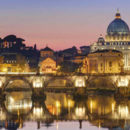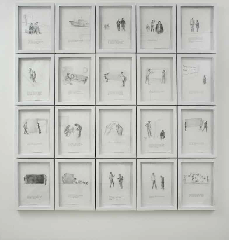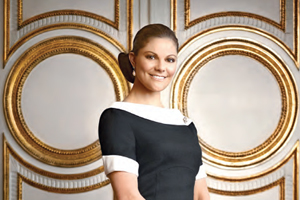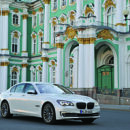
Cătălin Crețu, VISA Romania: “Only when we start to value leaders, we will have proper leaders”
Engineer and political science researcher by formation, Cătălin Crețu is known today as a reputed banking and electronic payments specialist who has been leading VISA Romania since 2004. Never scared of change, nor of answering questions, but “only of people with no sense of humour,” he says, Crețu openly talked about his career, made a frank assessment of what Romania lacks and shared his views on leadership.
Like many young men of that time, you began your studies in engineering before 1989, graduated in 1992, but a decade later you ended up with a PhD in political science in New York. How does this twist of fate makes sense to you?
Engineering was a sort of trait of the world we lived in back then. The world was very predictable in terms of the choices you could make, even if there wasn’t much choice, but 1989 did a reset for many of us who were in university. When I finished, I went and worked with a friend for his newly born consulting firm and we were part of a team who helped the American election monitors at the 1992 elections. Then I was hired at the International Organization for Migration (IOM).
At the time I was making $250 a month and I read that this was more that the President of Romania earned. I didn’t see a radical change coming, but change came. I was given a scholarship for a Master’s in European studies in Prague. I didn’t want to go, because it was taking me completely out of my comfort zone. I asked my IOM boss and he said “Don’t even think about it, go, you cannot even imagine how this will change your life.”
So, I went, studied a year in Prague, then I was selected to go to Columbia University in New York for a year. Prague was still part of our world, a better version of what we had been used to, but New York was a totally different world. I did a master in international affairs at the SIPA – School of International and Public Affairs.
It was very hard in the beginning because of the differences between the US and the European education systems. I went to one of my teaching assistants and asked: “Why am I not doing as expected? I know I’m not dumb.” He told me: “You are building your argument the wrong way, instead of telling me your argument upfront, you wait until the end. No one has the patience for that.” Then I started to understand how to perform in the US system and the taste came, as we say, the taste comes with eating…
You could have taken various paths further in life. What took you to banking?
After the masters’, I was accepted into the PhD program of New York University, but I had to work as a teaching assistant. During summer, the scholarship stopped, so I was between my third fourth year when I looked at the summer job board and found a job at HSBC Bank: it meant doing a project to assess the environmental impact of the bank.
I looked on the internet, read everything I could find on the topic, and they hired me. I was a nobody, hired to do a project for a summer job, but they gave me access to all senior managers to get data, to understand their policies. I had found a methodology to assess this impact that was used in Europe, by Swiss banks.
They said to me “What are you thinking of doing with your life? We love what you did for us. We’re gonna get you to an interview with the chief operating officer”, a guy everyone was afraid of. He asked me: “I wanna keep you here, what do you want to do?” “What I’d like to do is something very diverse,” I answered and he replied: “I’m gonna assign you to the special projects unit, here in New York, and you will deal with all complex projects that involve different regions, different divisions all across the group.” That’s how I got into banking.
I liked very much to do those projects where you had no preparation, but you had been given a project and had to lead it. Everyone knew what they did, except from the project manager who had the project management skills.
Was there anything specifically American that you took with yourself when you returned to Romania?
The American way, if you want to call it like this, is characterized by being very direct, practical and accoutanble for what you do. There’s a clear expectation that people need to know precisely what to do and they are evaluated very clearly at the end, depending on deliverables. Americans are good at separating the individual from the performance. They make it about what the individual does, not about who the individual is.
As of 2015, over 50% of payments in Romania are made by cards. How difficult was it to arrive here and how do you see the future of electronic payments in our country?
We are not looking at a product, a detergent. We’re not working at making people move from one detergent to another. We are dealing with a very personal, very important behaviour. Romanians were used to paying only with cash, and not even a lot of cash, because we know there were many deprivations in this country, we had one of the worst situation in the Eastern block. Coming from that mindset to changing the way you pay is big transformation.
For instance, Croatia and Slovenia, as part of the former Yugoslavia, have been using American Express cards since the 1970s. They have a 40-year history of using cards. We were not used to that and changing this type of behaviour is fascinating. It has to do with promotion, marketing, with public speaking, engaging with goverment, engaging with banks and trying to reach the mind of our end users.
Although our brand is one of the most popular in the world, we do not deal with the VISA card holder. We do that through banks, it’s an indirect relation. It’s a very difficult job, but also full of opportunities.
VISA helps its customers spend money safely, but doesn’t the company feel that it is responsible for advising people to spend wisely?
In the very developed markets, like the USA, the UK, there is a concern of what is the side effect of using cards. This effect is much more limited here, primarily because we are a country of debit card holders. People spend what they have. A card is like a knife, you can use it to cut meat, bread, but if you don’t know how to use it you can cut yourself. The main concern is to make people understand the benefits of using electronic payments.
Another facet is the impact of electronic payments on the economy. There’s an inverse correlation between the level of electronic payments and the level of grey economy. In Romania, the grey economy is huge, 28% of GDP, €30-40 billion. This domain has an important role in helping the state. Electronic payments are traceable, taxable, transparent. Cash is the main ally of those who want to bribe, to steal. It’s a fascinating industry that has been growing on double digits for many years and we are going to grow further.
Ultimately, we’re now at a crossroads where our industry will be seriously disupted. All the giants like Google, Apple, Samsung, Amazon, Facebook have their eyes on payments and have billions to invest. These are interesting times for this industry that will reinvent the way we pay.
Although some aspects look better than 10-15 years ago, Romania still has serious problems. Otherwise millions of Romanians wouldn’t be working abroad. If you weren’t a VISA manager, but a political leader, which were the top 3-5 things you would improve?
There’s a lot to be done economically. But the most important thing that is missing at this point in time is the trust in leadership, the trust that leaders are capable of doing what political leaders should do, that is leading the country to prosperity. And not just 5% of the population.
What we have seen in recent time is a very dangerous rejection of the political class, to the point of people saying on the streets: “All of you are the same, none of you serves our interests.” This is the most important thing that is lacking – trust in our leaders. How can it be regained? Number one: people want to see that those leading them are honest. Secondly, those leading them should do what they say that they will do. Thirdly, leaders should deliver something.
This is not rocket science, we know what it should be done. It’s about infrastructure, so that the entire country be connected and foreign investment can flow in all directions, not only in certain areas. Then, the few industries we can excel at – IT, agriculture, tourism – should be structured, organised, developed in a professional way. Also, although they don’t bring an immediate return on investment, we should invest in health and education. If you don’t invest in your people, you don’t have anything.
On the other hand, we have prime ministers making €1,500 or €2,000 per month. I don’t want a prime minister that is paid that little, because I understand that’s the value he will bring to the country. I want all these leaders to be properly paid, so that they don’t get any interest in other sources of revenue, mostly illegal. And I want them punished if, although well paid, they took bribe. But only when we start to value leaders, we will have proper leaders.
Can you describe an ideal leader and how do you see yourself in relation to this ideal?
Let’s start with what is not a leader! I think this is quite appropriate in this country. We are a country of leaders. Everyone you ask now coming from university, they’d tell you they want to be a manager. Oftentimes, you find leaders who believe that leadership is to tell people what to do, because he or she – and it’s usually he, I think that if we had more women in positions of power, we would do much better – believes that he is the repository of the ultimate truth.
In my view, you can’t disconnect a leader from the people that make him a leader. The people that allow you or want you to be their leader are those who make you a leader, not the other way around. Ultimately, you’re not the leader of a group, unless the group acknowledges you and approves you as a leader. The best thing that a leader can do is to recognize that he doesn’t know everything, that there are people who know much better than him and, as a result, if he wants to be a leader in an area, he must catalyze and enable the opinions of others.
You are only as good a leader as your team. If you have a team of yespeople, then, yes, you are the only one who can say what those people need to do. A leader must make sure that he is replaceable, that those there are led and the company can continue to do well after he moved on.
Do you have a “lesson of life” that would be worth sharing to others?
One important thing, metaphorically said, would be this: don’t tak shortcuts! They may be tempting, because you get from point A to point B faster, but you lose the experience of the journey and you lose the learning. I see a lot of people who want to get somewhere very fast. It’s not the final point that makes become you something, it’s the journey.
Also, don’t be superficial! Try to really give to whatever you do your full potential! Put everything you have into everything you do, because otherwise you’re just spending time! If you feel you don’t like what you’re doing, just get out of it! It’s not easy, because there are always bills to pay, but try to get out, otherwise you will regret. So your best so that you never regret not having done it!
Is there life after VISA? For family, friends, passions, sports?
Of course, there is. There are some people who say that have a very clear distinction, saying “At 5 I leave the office and have my other life.” It’s not like that for me. The job that you are doing and you love to do, the family you love are all part of life. Aside from family, I enjoy sports, especially tennis, and music. I listen to a lot of music, but mainy jazz and classical.
If you worked for Boeing, I’d ask you about Airbus. Since you work for VISA, I’ll ask you: tell me something you like about MasterCard and how closely you keep an eye on them?
In the world in which we will all live soon, it’s not only MasterCard that will be our fiercest competitor. Even now, the big pie is not with MasterCard, it’s with the cash, so, if I were to be asked “Where do you want to get more business from?”, I wouldn’t answer “From MasterCard.” I would like to get more business from people staring to pay utility bills with their cards.
Yes, we keep a very close eye on all our competitors. It’s always very good to have good competition, because it keeps you motivated to do better. You learn from competitors, if they do something better, you want to do even better.
At the end of each day, what matters most to you in life?
It always feels good to be home, I can say that because I travel a lot to many places. Although everyone loves their comfort zones, I am prepared for changes. Don’t be afraid of whatever comes your way and try to make the most of it! As I’m saying this, a quote from the movie Forrest Gump comes to my mind: “Life is a box of chocolates, you never know what you’re gonna get.”
Many times we have fears, pains, all sort of crises, professional or personal. I try to observe and don’t have immediate reactions. I try to react after some thinking. I appreciate my comfort zones as much as I appreciate change, I am a quintessentially adaptable person.









